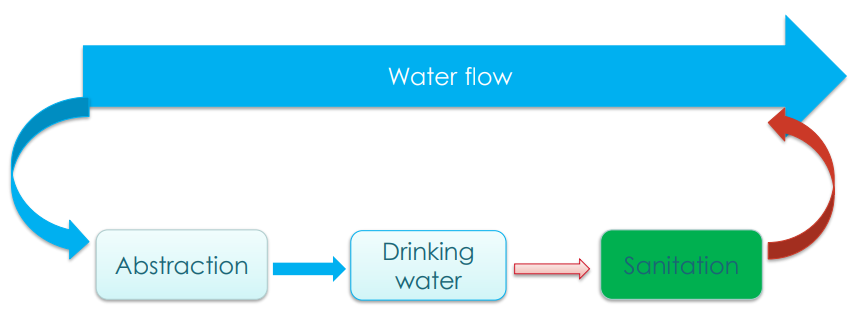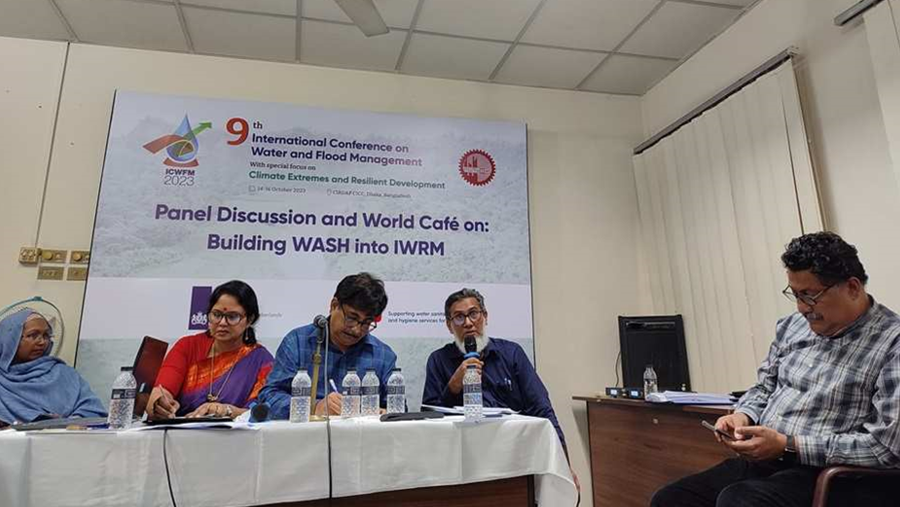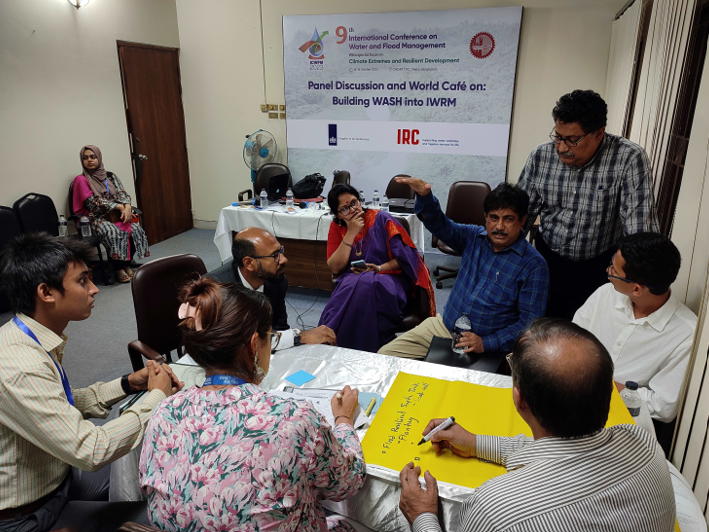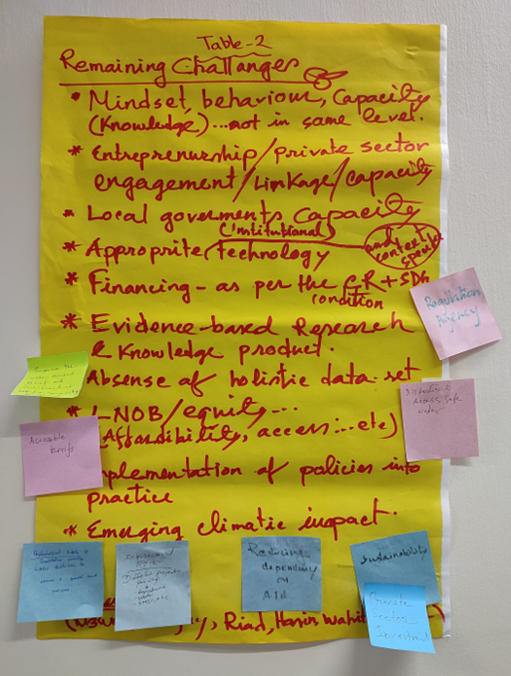Published on: 01/11/2023
In a multi-sectoral area such as water resources management, isolated initiatives may be utterly ineffective, and in some cases, counterproductive. Expanding the scope of Water, Sanitation and Hygiene (WASH) and fitting it into the broader scope of Integrated Water Resources Management (IWRM) can be a realistic approach for a lasting solution.
Recognising this priority, the Embassy of the Kingdom of the Netherlands in Bangladesh and IRC WASH organised a panel session titled Building WASH into IWRM at the 9th International Conference on Water and Flood Management (ICWFM 2023). In his welcome speech, Dr. Shibly Sadik, Senior Policy Advisor (IWRM) at the Dutch Embassy, expressed his and the embassy's expectation that WASH should no longer be considered a separate issue but integrated into IWRM and other development agendas.
The session drew examples from three NGO-led diverse WASH programmes intervening in different regions and different administrative settings of Bangladesh. The three NGOs that shared their programme experiences were BRAC, SNV and the Max Foundation.
Domestic use of water contributes little to overall water consumption, which includes industrial, and agricultural use. Nevertheless, domestic use requires safe water and is therefore crucial to human life. It is also our responsibility to safely return the water we use to the ecosystem. This is how WASH fits into the bigger canvas of Water Resources Management (WRM).

The diagram above, taken from IRC's presentation, is a simplified representation of the relationship between WASH and WRM. The boundary of IWRM is much broader than WRM. When water resources are managed following the principles of social equity, economic efficiency and environmental sustainability then we can call it IWRM. However, implementing WASH projects keeping IWRM in mind faces complex challenges. Riad Imam Mahmud, country director for Max Foundation, categorised the challenges into three categories: climatic, water management, and governance or institutional challenges. Climatic challenges cause significantly lower yield of water in the Barind region of Bangladesh. On the other hand, excessive salinity is taking a toll in the coastal regions affecting at least 10% of handpumps. Also, water logging impacts progress in sanitation and hygiene. Moreover, flash floods and cyclones in different regions destroy many improved toilets every year as reflected in the presentations of BRAC and SNV.
Water management challenges include increasing costs for improvement and innovation. This discourages WASH entrepreneurship, which results in a 30% dropout of local entrepreneurs. Furthermore, the WASH sector is plagued by governance or institutional challenges regarding community engagement, equity, and access.

Photo: Digbijoy Dey/IRC
As discussions reached a climax, three key issues - policy gap, lack of data, and lack of coordination - were identified by panellists and experts - Motaleb Hossain Sarker, CEGIS, Ismat Ara Parvin, Institute of Water Modelling, Dr. Sharmind Neelormi, Jahangirnagar University and Partha Hefaz Shaikh, WaterAid. Economics Professor Sharmind Neelormi called for making the WASH arena more data driven. According to her, how every drop of water is managed in the irrigation system should be quantified. She also shared some anecdotes about the vulnerability of the WASH system in the coastal region, where toilets are washed away during cyclone-like disasters.
Good news came from Motaleb Hossain Sarker. The Bangladesh Government has started a new project 'My village-My Town' where modern amenities for the citizens will be expanded without changing the traditional form of the village. The project has completed a feasibility study in 16 villages in different climatic hotspots of Bangladesh. The feasibility study came up with context specific WASH technologies that will be scaled up in the project and can be used by other programmes and initiatives.
Conference discussions were followed by a world café session which revolved around three pressing questions: proven technologies or approaches in climate-challenged areas, remaining gaps in making the WASH services sustainable in those areas, and gender equality and the needs of marginalised communities in WASH and IWRM interventions.

Photo: Digbijoy Dey / IRC
In the world café session, participants with extensive experience in the WASH and IWRM arena, were divided into three groups. They addressed the remaining challenges that the stakeholders must work on. One major point, raised multiple times, was the absence of holistic data. Other challenges included WASH entrepreneurship, appropriate technology, climatic impact, gender equality, and institutional empowerment (such as the local government's capacity). On technology issues, there were recommendations regarding flood-resilient septic tanks, DEWATS (Decentralized Wastewater Treatment Systems), reverse osmosis technologies, emptying (pit) devices, pond sand filters, rainwater systems, and biosand technology.

Photo: Digbijoy Dey / IRC
The Remaining Challenges table discussed both existing and new challenges. Existing challenges include: orthodox mindset/behaviour, poor institutional capacity, weak planning and finance and lack of equity and affordability. With climate change, the need for new innovative research, holistic data and finance for climate resilience have surfaced as new challenges.
It is noteworthy that the third table, which was looking for good models that address gender equality or the need of marginalised communities came up with fewer examples. They found examples such as community water points, rainwater harvesting systems or pond sand filters to address the needs of women and marginalised people. A WASH programme or intervention designed for women or marginalised communities is rare. It was also clear from the discussion that there was negligible participation of women and marginalised community members in planning and management processes.
The session ended up with a consensus to continue the discussion on this topic. For instance, one of the panellists, Motaleb Hossain Sarker, enthusiastically invited the WASH resource persons present in the session to CEGIS's dissemination and discussion of the 'My village-My Town' project's feasibility study and the national SDG 6.5.1 action plan. Both are examples of the inclusion of WASH in the IWRM planning process.
Thanks to Dr. Shibly Sadik for his input into the blog, which was copy-edited by Tettje van Daalen and Cor Dietvorst.
Bangladesh is one of the most vulnerable countries to climate change. In an Embassy of the Kingdom of Netherlands sponsored project (2022-2026), IRC along with BRAC is working towards developing a sustainable model for WASH services in climate hotspots of Bangladesh. Read more about the project on Equitable and Sustainable WASH Services in Bangladesh Delta Plan Hotspots (2022-2026).
For an introduction to linking WASH with IWRM read "A guide to addressing Integrated Water Resource Management in implementation of the Dutch Ministry of Foreign Affairs WASH strategy 2016-2030".
At IRC we have strong opinions and we value honest and frank discussion, so you won't be surprised to hear that not all the opinions on this site represent our official policy.